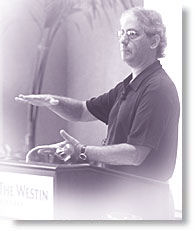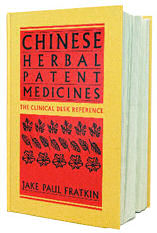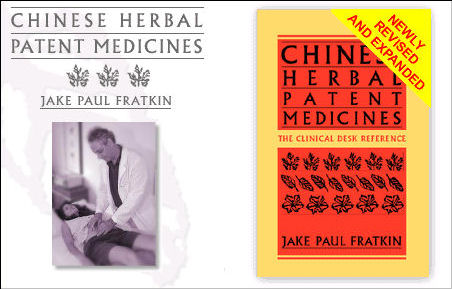Acupuncture & TCM Articles

Articles by Jake Paul Fratkin, OMD, LAc
Jake Fratkin, OMD, LAc, has been in the practice of Oriental medicine since 1978. Following undergraduate and graduate training at the University of Wisconsin in Chinese language and philosophy and pre-medicine, he pursued a seven-year apprenticeship in Japanese and Korean style acupuncture with Dr. Ineon Moon and a two-year apprenticeship in Chinese herbal medicine with Drs. Zhengan Guo and Pak-Leung Lau in Chicago. He also spent a year in Beijing hospitals interning in advanced herbal medicine, specializing in gastrointestinal and respiratory disorders, and pediatrics.  Dr. Fratkin is the author of several books, including Chinese Herbal Patent Medicines: The Clinical Desk Reference, and is the editor-organizer of Wu and Fischer's Practical Therapeutics of Traditional Chinese Medicine. In 1999, he was named the "Acupuncturist of the Year" by the American Association of Oriental Medicine.
Dr. Fratkin is the author of several books, including Chinese Herbal Patent Medicines: The Clinical Desk Reference, and is the editor-organizer of Wu and Fischer's Practical Therapeutics of Traditional Chinese Medicine. In 1999, he was named the "Acupuncturist of the Year" by the American Association of Oriental Medicine.
Chinese Herbal Patent Medicines: The Clinical Desk Reference
Hardback book, 1198 pages. This volume covers 1360 products, including 550 GMP level products and all of California FDB analysis on 505 products. Includes information on endagered animals, heavy metals, and pharmaceuticals. The text is organized into 12 groups, with a total of 109 chapters and includes material by Andrew Ellis, Subhuti Dharmananda, and Richard Ko. Over 80 pages of full-color photos (with English and Chinese cross-reference). Fully indexed.
Concerning “Chinese Herbal Nephropathy”
Chinese nephropathy exists. There have been hundreds of cases of kidney-failure due to aristolochic acid-containing Chinese herbs in the West, and probably many times more in China, Taiwan and throughout Asia. This problem was first identified in the early 1990s in Belgium, when toxic herbs containing aristolochic acid (AA) were wrongfully used in weight-loss formulas. Herbs containing aristolochic acid were identified, listed, and promptly banned throughout Europe, the UK, and the USA. Presently, in the United States, it is virtually impossible to obtain raw herbs or products containing AA, with the possible exception of small Chinatown herb stores importing herbs and products from overseas relatives.
American patients of licensed practitioners of Chinese herbal medicine should have confidence. Established importers like Nuherbs batch-check raw herbs and herbal products as they arrive in California. They have Certificates of Analysis from independent American laboratories that are available for every herb and every formulated product. All herbal formulas come from factories meeting international levels of GMP (Good Manufacturing Practice). There are no heavy metals, pharmaceuticals, or other chemicals, and no herbs listed as containing aristolochic acid or other known toxins.
Despite these standards, there is a growing chorus from medical doctors about the toxicity of Chinese herbs, about how they cause kidney failure, in general. Although the aristolochic acid nephropathy nephropathy issue was settled almost 20 years ago, doctors continue to malign the safety of Chinese herbs, in general. In the last month or so, at least three patients reported to me that their physicians told them not to take Chinese herbs because they cause kidney failure. A pediatrician told a mother not to give her baby herbs I had recommended, because “Chinese herbs cause kidney failure, especially in children”!
This is absurd. What started as an isolated clinical phenomenon has morphed into a modern urban legend, spread by innuendo and misinformation, and not at all based on the facts. This is somewhat surprising, given the medical profession’s reliance on “evidence-based medicine”. It is also surprising because, outside of the cases of AA herbal nephropathy, there have been no other cases of toxicity or harmful effects in Chinese medicine as practiced in the United States. None. Zip. Nada. [i]
Here are the facts. Aristolochic acid can be toxic to the kidneys in large amounts or prolonged application, and Chinese TCM textbooks have pointed this out since the 1950s. Well-educated TCM herbalists do not commonly use herbs containing AA. The main cases involving toxic levels of AA herbs have occurred with improper substitution of AA herbs for non-AA herbs that have a similar name. For example, the initial situation in Belgium involved the substitution of guang fáng ji (???, Radix Aristolochiae Fangchi) for fáng ji (??, Radix Stephaniae Tetrandrae). A medical doctor without knowledge or training in TCM made this substitution in his weight-loss clinic, obtaining the herb from unreliable sources. He used large amounts of guang fáng ji for prolonged periods of time, certainly beyond what a traditional prescription would call for.
Other substitutions with toxic AA herbs have included guan mù tong (???, Caulis Aristolochiae Manshuriensis) for chuan mù tong (???, Caulis Clematidis Armandii), and qing mù xiang (???, Radix Aristolochiae), for mù xiang (??, Radix Aucklandiae).
Several other herbs with very trace amounts of aristolochic acid have also been banned: xún gu feng (???, Herba Aristolochia Mollissimae); tian xian téng (???, Herba Aristolochiae); ma dou líng (???, Fructus Aristolochiae); and xì xin (??, Radix et Rhizoma Asari).
Out of the 658 herbs listed in John and Tina Chen’s authoritative materia medica, only the 7 herbs listed above are shown to contain aristolochic acid compounds! How does this allow the blanket statement “Chinese herbs cause kidney failure”?![ii]
Recent scientific literature concerning Chinese herbs and aristolochic acid has been accurate and helpful[iii], but there are doctors who assume that if there is kidney disease, and if the patient has been on Chinese herbs, that there is a direct cause and effect. In these cases, it is important for the TCM herbalist to assure or prove to the concerned physician that aristolochic acid herbs were not used in that patient.
The Original Situation in Belgium
The case started in 1992 in Belgium with 2 women who died of end-stage renal disease (ERD). Both were involved in the same weight-loss program, which involved herbs, serotonin injections, and other medications. Later, 100 patients belonging to the same weight-loss program had renal failure requiring dialysis. (Between 1500 and 2000 people were enrolled in that program, with an AAN rate of 3-5%.[iv]) Chemical analysis of the herbs used revealed that while fáng ji (??, Radix Stephaniae Tetrandrae) was prescribed in the formula, guang fáng ji (???, Radix Aristolochiae Fangchi) was actually used. Aristolochic acid was assumed to be the main causative nephrotoxic agent. This clinical presentation came to be called Chinese-herb nephropathy (CHN) or AA nephropathy (AAN) in the medical literature. Since then, AAN was discovered in hundreds of additional cases, mostly in Asia, but also in the US and European countries.
Dr. Subhuti Dharmananda, in an excellent article from 2001, questions whether aristolochic acid herbs are even that toxic. First, citing a 2000 NEJM article, he says that while AA may have been a contributing factor, kidney failure at the weight-loss program may have been due to a combination of factors, including serotonin injections that have been shown to cause kidney injury. Secondly, Dr. Dharmananda points out that the AA herbs were used for far longer periods of time than is normal in TCM, and that the herbs were in powdered/capsule form, whereas traditional water extraction minimizes the release of aristolochic acid. Finally, the AA herbs may have become more toxic in combination with Western medications. “It is possible that use of the herb medicines derived from Aristolochia plants when used alone rarely, if ever, cause renal failure, but that when combined with certain drugs, the toxicity develops…. If this were the case, it would support the contention that it is the non-traditional use of the herbs that led to the problem, rather than the herbs themselves.”[v]
In conclusion, I would state the following concerning Chinese herbs in the United States. First, aristolochic acid herbs have been certifiably removed from circulation as raw herbs, powdered herbs and herbal products. Second, there has been no incident or evidence that any other (non-AA) Chinese herb used by trained practitioners have caused any negative health events.[vi] Finally, Chinese herbs are significantly safer than Western pharmaceuticals in terms of adverse reactions or death.
Unfortunately, the reputation of Chinese herbs is genuinely marred because there are products in Chinatown herb shops that have been adulterated with heavy metals, pharmaceuticals and other additives. They are not common, and most have Chinese language packaging only. They are definitely not the products that licensed practitioners obtain through companies like Nuherbs and Mayway. Our patients need to know that we use GMP products and lab-tested raw or powdered herbs only.
What may be required, for public safety and confidence, is a middle classification for Chinese herbs that lies between a DSHEA nutritional supplement and a prescription pharmaceutical, and that prescribing Chinese herbs requires a certification of competency. Such a certification already exists, in the form of NCCAOM’s Chinese Herbology certification. If the government is determined to restrict the public’s access to Chinese herbs, than this legal qualification would satisfy the FDA, herbal practitioners and the public.
--------------------------------------------------------------------------------
[i] In terms of real toxicity, pharmaceutical medicine causes 113,000 deaths per year when properly prescribed. If we factor in all of the deaths due to Western medicine, including unnecessary surgery and hospital infections, that total rises to 225,000 deaths per year. (“In the United States, figures suggest estimated deaths per year of 7,000 due to medication errors in hospitals and 106,000 due to non-error, negative effects of drugs”. http://en.wikipedia.org/wiki/Iatrogenesis)
JAKE PAUL FRATKIN, OMD is a Doctor of Oriental Medicine in practice since 1978. After seven years basic training in Japanese acupuncture and Chinese herbal medicine in this country, he went to Beijing for one year to do advanced hospital training in herbal internal medicine, pediatrics and medical qi gong. He is the author of CHINESE HERBAL PATENT MEDICINES, (2001), a respected reference work of 1200 Chinese herbal products available in this country. In 1999 he received the national award, Acupuncturist of the Year, from the American Association of Oriental Medicine, and 2006 he received the award as Acupuncture Teacher of the Year. He is a recognized expert in the treatment of leaky gut syndrome, chronic respiratory and digestive disorders. Jake lives and practices in Boulder, Colorado.
[ii] John Chen, Tina Chen, Chinese Herbal Formulas and Applications, Art of Medicine Press, 2009.
[iii] See: (1)“Aristolochic Acid (Chinese-herb) Nephropathy” by Huong Thi Bich Tran, MD, and Li-Li Hsiao, MD, www.nephropathyrounds.org, Feb, 2008; (2) the chapter “Mechanisms of Nephrotoxicities of Herbal Medicine” in Critical Care Nephropathy by Ronco, Bellomo, and Kellum, Saunders, 2008; (3) “Increased Risks of Chronic Kidney Disease associated with Prescribed Chinese Herbal Products Suspected to Contain Aristolochic Acid”, Ming-Nan Lai et al, Nephropathy, Volume 14, Issue 2, pages 227–234, March 2009.
[iv] Tran and Hsiao.
[v] “Are Aristolochia Plants Dangerous?” by Subhuti Dharmananda, Ph.D. http://www.itmonline.org/arts/aristolochia.htm
[vi] Trained herbalists understand the contraindication of certain blood stasis-breaking herbs with Coumadin, and the potential for premature labor in the third trimester with stasis-breaking and purgative herbs.
 
|
